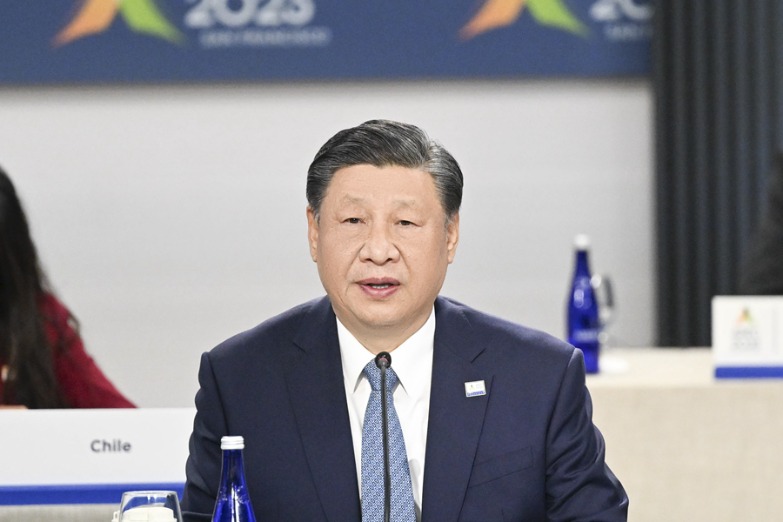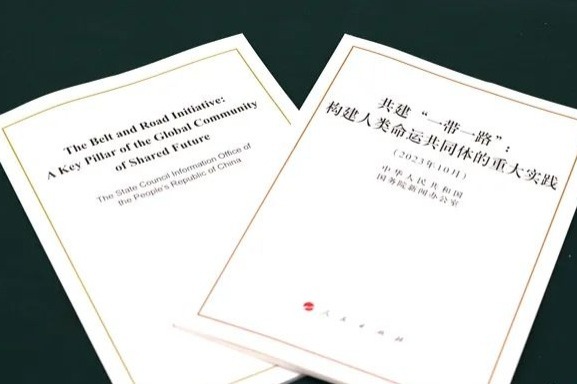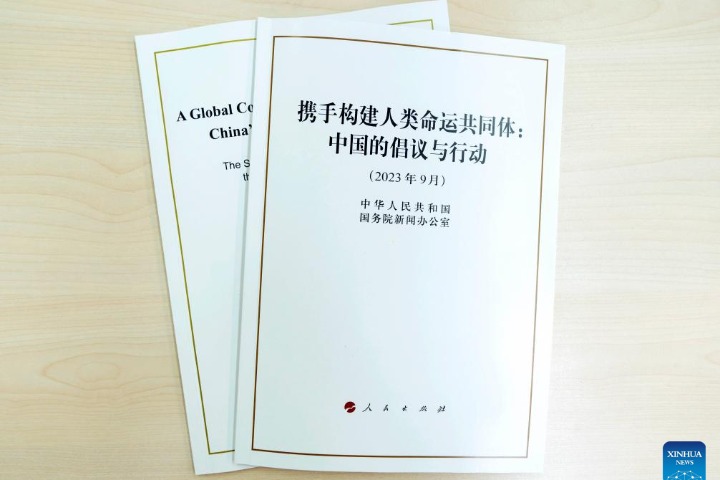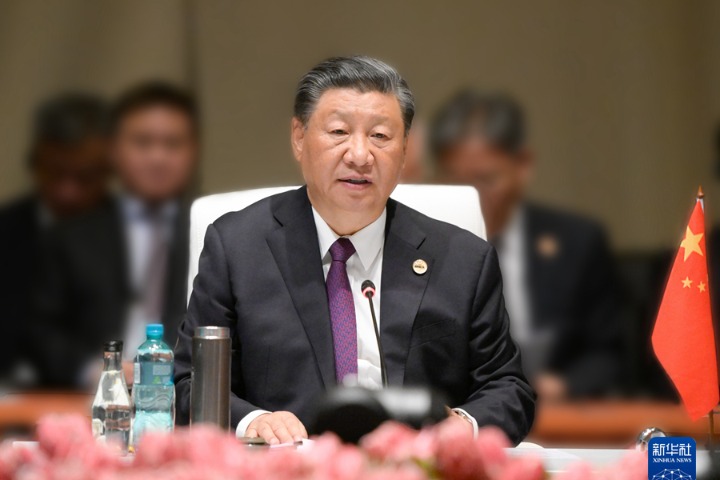中國應(yīng)對(duì)氣候變化的政策與行動(dòng)(雙語全文)
新華網(wǎng) 2021-10-27 16:52

四、共建公平合理、合作共贏的全球氣候治理體系
IV. Building a Fair and Rational Global Climate Governance System for
Win-Win Results
面對(duì)復(fù)雜形勢和諸多挑戰(zhàn),應(yīng)對(duì)氣候變化任重道遠(yuǎn),需要全球廣泛參與、共同行動(dòng)。中國呼吁國際社會(huì)緊急行動(dòng)起來,全面加強(qiáng)團(tuán)結(jié)合作,堅(jiān)持多邊主義,堅(jiān)定維護(hù)以聯(lián)合國為核心的國際體系、以國際法為基礎(chǔ)的國際秩序,堅(jiān)定維護(hù)《聯(lián)合國氣候變化框架公約》及其《巴黎協(xié)定》確定的目標(biāo)、原則和框架,全面落實(shí)《巴黎協(xié)定》,努力推動(dòng)構(gòu)建公平合理、合作共贏的全球氣候治理體系。
Due to the complexity of the problem and the many facets of the challenge, addressing climate change remains a long and arduous task that demands wide participation and a concerted effort from around the globe. China calls on the international community to take immediate action, strengthen solidarity and cooperation, and remain committed to multilateralism. The whole world should safeguard the international system with the UN at its core and the international order underpinned by international law. All countries should uphold the goals, principles and framework set in the United Nations Framework Convention on Climate Change and the Paris Agreement, implement the latter in full, and build a fair and rational global climate governance system for win-win results.
(一)全球應(yīng)對(duì)氣候變化面臨嚴(yán)峻挑戰(zhàn)
1. Severe Challenges to Global Efforts on Climate Change
工業(yè)革命以來的人類活動(dòng),特別是發(fā)達(dá)國家大量消費(fèi)化石能源所產(chǎn)生的二氧化碳累積排放,導(dǎo)致大氣中溫室氣體濃度顯著增加,加劇了以變暖為主要特征的全球氣候變化。世界氣象組織發(fā)布的《2020年全球氣候狀況》報(bào)告表明,2020年全球平均溫度較工業(yè)化前水平高出約1.2℃,2011年至2020年是有記錄以來最暖的10年。2021年政府間氣候變化專門委員會(huì)發(fā)布的第六次評(píng)估報(bào)告第一工作組報(bào)告表明,人類活動(dòng)已造成氣候系統(tǒng)發(fā)生了前所未有的變化。1970年以來的50年是過去兩千年以來最暖的50年。預(yù)計(jì)到本世紀(jì)中期,氣候系統(tǒng)的變暖仍將持續(xù)。
Human activity since the Industrial Revolution, particularly the cumulative carbon dioxide emissions resulting from the huge consumption of fossil fuels by developed countries, have led to a significant increase in the atmospheric concentration of greenhouse gases exacerbating climate change characterized by global warming. As is stated in the State of the Global Climate 2020 released by the World Meteorological Organization, the global mean temperature for 2020 was around 1.2 °C warmer than pre-industrial times, and the last 10-year average (2011-2020) was the warmest on record. The Working Group I report of the Sixth Assessment Report of the Intergovernmental Panel on Climate Change (IPCC), which was released in 2021, showed that human activity has caused unprecedented changes to the climate system. According to the report, the five decades since 1970 was the warmest period in the last 2,000 years. It was projected that climate warming will continue beyond the middle of the century.
氣候變化對(duì)全球自然生態(tài)系統(tǒng)產(chǎn)生顯著影響,全球許多區(qū)域出現(xiàn)并發(fā)極端天氣氣候事件和復(fù)合型事件的概率和頻率大大增加,高溫?zé)崂思案珊挡l(fā),極端海平面和強(qiáng)降水疊加造成復(fù)合型洪澇事件加劇。2021年,有的地區(qū)遭遇強(qiáng)降雨,并引發(fā)洪澇災(zāi)害,有的地區(qū)氣溫創(chuàng)下歷史新高,有的地區(qū)森林火災(zāi)頻發(fā)。全球變暖正在影響地球上每一個(gè)地區(qū),其中許多變化不可逆轉(zhuǎn),溫度升高、海平面上升、極端氣候事件頻發(fā)給人類生存和發(fā)展帶來嚴(yán)峻挑戰(zhàn),對(duì)全球糧食、水、生態(tài)、能源、基礎(chǔ)設(shè)施以及民眾生命財(cái)產(chǎn)安全構(gòu)成長期重大威脅,應(yīng)對(duì)氣候變化刻不容緩。
Climate change has had a significant impact on the Earth’s natural ecosystems. In many regions across the world, the probability and the frequency of concurrent extreme weather and climate events and compound events have risen notably. Heatwaves and droughts have hit simultaneously, and extreme sea levels and strong precipitation have caused more frequent and severe compound flooding. In 2021, some areas have been battered by heavy rainfall and consequent floods; some have seen new temperature highs; some have been ravaged by wildfires. Global warming is affecting every region on our planet, and many of the changes are irreversible. Rising temperatures and sea levels and frequent extreme climate events pose a serious challenge for the very survival of humanity and are long-term major threats to the security of global food, water, ecology, energy and infrastructure, and to people’s lives and property. Therefore, addressing climate change is a task of great urgency.
(二)中國為全球氣候治理注入強(qiáng)大動(dòng)力
2. China Provides Powerful Impetus for Global Climate Governance
中國一貫高度重視應(yīng)對(duì)氣候變化國際合作,積極參與氣候變化談判,推動(dòng)達(dá)成和加快落實(shí)《巴黎協(xié)定》,以中國理念和實(shí)踐引領(lǐng)全球氣候治理新格局,逐步站到了全球氣候治理舞臺(tái)的中央。
China attaches great importance to international cooperation on climate change. It is an active participant in climate talks; it has contributed to the conclusion and quick implementation of the Paris Agreement; with its own vision and action it has charted the course for a new form of global climate governance. It has thus gradually moved onto the center stage of global climate governance.
領(lǐng)導(dǎo)人氣候外交增強(qiáng)全球氣候治理凝聚力。習(xí)近平主席多次在重要會(huì)議和活動(dòng)中闡釋中國的全球氣候治理主張,推動(dòng)全球氣候治理取得重大進(jìn)展。2015年,習(xí)近平主席出席氣候變化巴黎大會(huì)并發(fā)表重要講話,為達(dá)成2020年后全球合作應(yīng)對(duì)氣候變化的《巴黎協(xié)定》作出歷史性貢獻(xiàn)。2016年9月,習(xí)近平主席親自交存中國批準(zhǔn)《巴黎協(xié)定》的法律文書,推動(dòng)《巴黎協(xié)定》快速生效,展示了中國應(yīng)對(duì)氣候變化的雄心和決心。在全球氣候治理面臨重大不確定性時(shí),習(xí)近平主席多次表明中方堅(jiān)定支持《巴黎協(xié)定》的態(tài)度,為推動(dòng)全球氣候治理指明了前進(jìn)方向,注入了強(qiáng)勁動(dòng)力。2020年9月,習(xí)近平主席在第七十五屆聯(lián)合國大會(huì)一般性辯論上宣布中國將提高國家自主貢獻(xiàn)力度,表明了中國全力推進(jìn)新發(fā)展理念的堅(jiān)定意志,彰顯了中國愿為全球應(yīng)對(duì)氣候變化作出新貢獻(xiàn)的明確態(tài)度。2020年12月,習(xí)近平主席在氣候雄心峰會(huì)上進(jìn)一步宣布到2030年中國二氧化碳減排、非化石能源發(fā)展、森林蓄積量提升等一系列新目標(biāo)。2021年9月,習(xí)近平主席出席第七十六屆聯(lián)合國大會(huì)一般性辯論時(shí)提出,中國將大力支持發(fā)展中國家能源綠色低碳發(fā)展,不再新建境外煤電項(xiàng)目,展現(xiàn)了中國負(fù)責(zé)任大國的責(zé)任擔(dān)當(dāng)。2021年10月,習(xí)近平主席出席《生物多樣性公約》第十五次締約方大會(huì)領(lǐng)導(dǎo)人峰會(huì)并發(fā)表主旨講話,強(qiáng)調(diào)為推動(dòng)實(shí)現(xiàn)碳達(dá)峰、碳中和目標(biāo),中國將陸續(xù)發(fā)布重點(diǎn)領(lǐng)域和行業(yè)碳達(dá)峰實(shí)施方案和一系列支撐保障措施,構(gòu)建起碳達(dá)峰、碳中和“1+N”政策體系;中國將持續(xù)推進(jìn)產(chǎn)業(yè)結(jié)構(gòu)和能源結(jié)構(gòu)調(diào)整,大力發(fā)展可再生能源,在沙漠、戈壁、荒漠地區(qū)加快規(guī)劃建設(shè)大型風(fēng)電光伏基地項(xiàng)目,第一期裝機(jī)容量約1億千瓦的項(xiàng)目已于近期有序開工。
China has contributed to global unity on climate governance through its leaders’ climate diplomacy. President Xi Jinping has elaborated China’s view on global climate governance at many events, facilitating major progress at the global level.
In 2015, he gave a keynote speech at the Paris Conference on Climate Change, making a historic contribution to the conclusion of the Paris Agreement on global climate action after 2020.
In September 2016, he deposited in person the legal instrument of China’s ratification of the Paris Agreement. This was a forceful push for the agreement to take effect quickly, showing China’s ambition and resolution in tackling climate change.
At critical moments when global climate governance is facing great uncertainties, President Xi has repeatedly expressed China’s firm support for the Paris Agreement, pointing the direction of global climate governance and adding powerful impetus.
In September 2020, at the general debate of the 75th session of the United Nations General Assembly, he announced that China will scale up its NDC, demonstrating China’s resolve in applying its new development philosophy and its clear attitude to make further contributions to global efforts against climate change.
In December 2020, at the Climate Ambition Summit, President Xi announced China’s further commitments for 2030 pertaining to matters such as the reduction of carbon dioxide emissions, the increase in use of non-fossil fuels, and the forest stock volume.
In September 2021, at the general debate of the 76th session of the United Nations General Assembly, he stated that China will step up support for other developing countries in developing green and low-carbon energy, and will build no new coal-fired power projects abroad, manifesting China’s sense of responsibility as a major country.
In October 2021, President Xi attended the Leaders’ Summit of the 15th Meeting of the Conference of the Parties to the Convention on Biological Diversity and delivered a keynote speech, in which he emphasized that to achieve its carbon peak and neutrality targets, China will release implementation plans for peaking carbon dioxide emissions in key areas and sectors as well as a series of supporting measures, and will put in place a “1+N” policy framework for carbon peak and carbon neutrality. China will continue to readjust its industrial structure and energy mix, vigorously develop renewable energy, and make faster progress in planning and developing large wind power and photovoltaic bases in sandy areas, rocky areas and deserts. The first phase of projects with an installed capacity of approximately 100 million kW has recently started construction in a smooth fashion.
積極建設(shè)性參與氣候變化國際談判。中國堅(jiān)持公平、共同但有區(qū)別的責(zé)任和各自能力原則,堅(jiān)持按照公開透明、廣泛參與、締約方驅(qū)動(dòng)和協(xié)商一致的原則,引導(dǎo)和推動(dòng)了《巴黎協(xié)定》等重要成果文件的達(dá)成。中國推動(dòng)發(fā)起建立了“基礎(chǔ)四國”部長級(jí)會(huì)議和氣候行動(dòng)部長級(jí)會(huì)議等多邊磋商機(jī)制,積極協(xié)調(diào)“基礎(chǔ)四國”“立場相近發(fā)展中國家”“七十七國集團(tuán)和中國”應(yīng)對(duì)氣候變化談判立場,為維護(hù)發(fā)展中國家團(tuán)結(jié)、捍衛(wèi)發(fā)展中國家共同利益發(fā)揮了重要作用。積極參加二十國集團(tuán)(G20)、國際民航組織、國際海事組織、金磚國家會(huì)議等框架下氣候議題磋商談判,調(diào)動(dòng)發(fā)揮多渠道協(xié)同效應(yīng),推動(dòng)多邊進(jìn)程持續(xù)向前。
China has been an active and constructive participant in international climate talks. It is committed to the principles of equity, common but differentiated responsibilities, and respective capabilities, and maintains that negotiations should be open, transparent, inclusive, party-driven and consensus-based. It played a leading role in and pressed ahead with the conclusion of key documents including the Paris Agreement. China initiated the establishment of multilateral negotiation mechanisms such as the BASIC Ministerial Meeting on Climate Change and the Ministerial on Climate Action. It actively coordinates the positions of countries within climate negotiation blocs such as the BASIC countries, the Like-Minded Developing Countries, and the Group of 77 and China, playing an important role in maintaining the unity of developing countries and defending their common interests. China actively participates in climate negotiations through the Group of 20, the International Civil Aviation Organization, the International Maritime Organization, the BRICS meetings and so forth, promoting the synergy of multiple channels and multilateral processes.
為廣大發(fā)展中國家應(yīng)對(duì)氣候變化提供力所能及的支持和幫助。中國秉持“授人以漁”理念,積極同廣大發(fā)展中國家開展應(yīng)對(duì)氣候變化南南合作,盡己所能幫助發(fā)展中國家特別是小島嶼國家、非洲國家和最不發(fā)達(dá)國家提高應(yīng)對(duì)氣候變化能力,減少氣候變化帶來的不利影響,中國應(yīng)對(duì)氣候變化南南合作成果看得見、摸得著、有實(shí)效。2011年以來,中國累計(jì)安排約12億元用于開展應(yīng)對(duì)氣候變化南南合作,與35個(gè)國家簽署40份合作文件,通過建設(shè)低碳示范區(qū),援助氣象衛(wèi)星、光伏發(fā)電系統(tǒng)和照明設(shè)備、新能源汽車、環(huán)境監(jiān)測設(shè)備、清潔爐灶等應(yīng)對(duì)氣候變化相關(guān)物資,幫助有關(guān)國家提高應(yīng)對(duì)氣候變化能力,同時(shí)為近120個(gè)發(fā)展中國家培訓(xùn)了約2000名應(yīng)對(duì)氣候變化領(lǐng)域的官員和技術(shù)人員。
China provides assistance and support within its means to other developing countries to tackle climate change. China engages in South-South cooperation on climate change with other developing countries. It has done its best to help those countries – in particular small island states, the least developed countries, and African countries – to build capacity to fight climate change and reduce the adverse impact of climate change. This cooperation has yielded real, tangible and solid results. Since 2011, China has allocated about RMB1.2 billion for South-South climate cooperation and signed 40 cooperation documents with 35 countries. It has helped countries to build low-carbon demonstration zones and provided them with climate-related supplies such as meteorological satellites, PV power generation and lighting equipment, NEVs, environmental monitoring devices, and clean cookstoves. It has trained about 2,000 officials and professionals in the field of climate change for nearly 120 developing countries.
建設(shè)綠色絲綢之路為全球氣候治理貢獻(xiàn)中國方案。中國堅(jiān)持把綠色作為底色,攜手各方共建綠色絲綢之路,強(qiáng)調(diào)積極應(yīng)對(duì)氣候變化挑戰(zhàn),倡議加強(qiáng)在落實(shí)《巴黎協(xié)定》等方面的務(wù)實(shí)合作。2021年,中國與28個(gè)國家共同發(fā)起“一帶一路”綠色發(fā)展伙伴關(guān)系倡議,呼吁各國應(yīng)根據(jù)公平、共同但有區(qū)別的責(zé)任和各自能力原則,結(jié)合各自國情采取氣候行動(dòng)以應(yīng)對(duì)氣候變化。中國同有關(guān)國家一道實(shí)施“一帶一路”應(yīng)對(duì)氣候變化南南合作計(jì)劃,成立“一帶一路”能源合作伙伴關(guān)系,促進(jìn)共建“一帶一路”國家開展生態(tài)環(huán)境保護(hù)和應(yīng)對(duì)氣候變化。
China offers its approach to global climate governance through building a green silk road. China aims to promote green development and is working with relevant partners to build a green silk road. It emphasizes the importance of an active response to the challenges of climate change and calls for closer results-oriented cooperation in implementing the Paris Agreement and in other areas. In 2021, China and 28 other countries launched the Initiative for Belt and Road Partnership on Green Development, advocating that climate change can be addressed through actions guided by the principles of equity and common but differentiated responsibilities and respective capabilities, weighted against different national circumstances. China is working with relevant countries to implement the Belt and Road South-South Cooperation Initiative on Climate Change, establish the Belt and Road Energy Partnership, and facilitate actions on ecological conservation and climate change.
(三)應(yīng)對(duì)氣候變化中國倡議
3. Tackling Climate Change: China’s Initiatives
應(yīng)對(duì)氣候變化是全人類的共同事業(yè),面對(duì)全球氣候治理前所未有的困難,國際社會(huì)要以前所未有的雄心和行動(dòng),勇于擔(dān)當(dāng),勠力同心,積極應(yīng)對(duì)氣候變化,共謀人與自然和諧共生之道。
Addressing climate change is a cause shared by all of humanity. Faced with unprecedented challenges in global climate governance, the international community needs to respond with unprecedented ambition and action. We need to act with a sense of responsibility and unity, take proactive measures, and work together to pursue harmony between humanity and nature.
堅(jiān)持可持續(xù)發(fā)展。氣候變化是人類不可持續(xù)發(fā)展模式的產(chǎn)物,只有在可持續(xù)發(fā)展的框架內(nèi)加以統(tǒng)籌,才可能得到根本解決。要把應(yīng)對(duì)氣候變化納入國家可持續(xù)發(fā)展整體規(guī)劃,倡導(dǎo)綠色、低碳、循環(huán)、可持續(xù)的生產(chǎn)生活方式,不斷開拓生產(chǎn)發(fā)展、生活富裕、生態(tài)良好的文明發(fā)展道路。
We must commit to sustainable development. Climate change results from unsustainable development models, thus it can be fundamentally resolved only by taking coordinated actions within the framework of sustainable development. All countries should integrate climate action into their national overall plans for sustainable development, promote a green, low-carbon, circular and sustainable approach to life and work, and foster a model of sustainable development featuring increased output, higher living standards, and healthy ecosystems.
堅(jiān)持多邊主義。國際上的事要由大家共同商量著辦,世界前途命運(yùn)要由各國共同掌握。在氣候變化挑戰(zhàn)面前,人類命運(yùn)與共,單邊主義沒有出路,只有堅(jiān)持多邊主義,講團(tuán)結(jié)、促合作,才能互利共贏,福澤各國人民。要堅(jiān)持通過制度和規(guī)則來協(xié)調(diào)規(guī)范各國關(guān)系,反對(duì)恃強(qiáng)凌弱,規(guī)則一旦確定,就要有效遵循,不能合則用、不合則棄,這是共同應(yīng)對(duì)氣候變化的有效途徑,也是國際社會(huì)的基本共識(shí)。
We must commit to multilateralism. International affairs should be addressed by all parties involved through consultation, and the future of the world should be shaped by all countries acting together. In meeting the climate challenge, no one can isolate themselves and unilateralism will get us nowhere. Only by upholding multilateralism, unity and cooperation can we deliver shared benefits for all nations. State-to-state relations should be coordinated and regulated through proper institutions and rules. The strong should not abuse the weak. Rules, once made, should be followed by all. They should never be options which are observed or abandoned according to national interests. This is an effective way of jointly addressing climate change that must be respected by all of the international community.
堅(jiān)持共同但有區(qū)別的責(zé)任原則。這是全球氣候治理的基石。發(fā)達(dá)國家和發(fā)展中國家在造成氣候變化上歷史責(zé)任不同,發(fā)展需求和能力也存在差異,用統(tǒng)一尺度來限制是不適當(dāng)?shù)模彩遣还降摹R浞挚紤]各國國情和能力,堅(jiān)持各盡所能、國家自主決定貢獻(xiàn)的制度安排,不搞“一刀切”。發(fā)展中國家的特殊困難和關(guān)切應(yīng)當(dāng)?shù)玫匠浞种匾暎l(fā)達(dá)國家在應(yīng)對(duì)氣候變化方面要多作表率,為發(fā)展中國家提供資金、技術(shù)、能力建設(shè)等方面支持。
We must commit to the principle of common but differentiated responsibilities. This is the cornerstone of global climate governance. Developed and developing countries shoulder different historical responsibilities for climate change, and they also have different development needs and capabilities. Therefore, it is unreasonable and unfair to enforce uniform restrictions on them. We should take into account different national circumstances and capabilities, and uphold the institutions according to which every country determines its contribution and does its part to the best of its ability. No one-size-fits-all standards should be adopted. Particular difficulties and concerns of developing countries should be accommodated. Developed countries should play an exemplary role in climate action and support developing countries in financing, technology, and capacity building.
堅(jiān)持合作共贏。當(dāng)今世界正經(jīng)歷百年未有之大變局,人類也正處在一個(gè)挑戰(zhàn)層出不窮、風(fēng)險(xiǎn)日益增多的時(shí)代,氣候變化等非傳統(tǒng)安全威脅持續(xù)蔓延,沒有哪個(gè)國家能獨(dú)善其身,需要同舟共濟(jì)、團(tuán)結(jié)合作。國際社會(huì)應(yīng)深化伙伴關(guān)系,提升合作水平,在應(yīng)對(duì)全球氣候變化的征程中取長補(bǔ)短、互學(xué)互鑒、互利共贏,實(shí)現(xiàn)共同發(fā)展,惠及全人類。
We must commit to win-win cooperation. The world is undergoing changes of a scale unseen in a century, and humanity is in an era in which challenges emerge one after another and risks increase with each passing day. Non-conventional security threats including climate change are spreading. No country is immune from such challenges. The whole world needs to work together in solidarity and engage in cooperation. Countries should learn from each other and make common progress in a global effort to combat climate change, with the goal of achieving shared development for all.
堅(jiān)持言出必行。應(yīng)對(duì)氣候變化關(guān)鍵在行動(dòng)。各方共同推動(dòng)《巴黎協(xié)定》實(shí)施,要持之以恒,不要朝令夕改;要重信守諾,不要言而無信。要積極推動(dòng)各國落實(shí)已經(jīng)提出的國家自主貢獻(xiàn)目標(biāo),將目標(biāo)轉(zhuǎn)化為落實(shí)的政策、措施和具體行動(dòng),避免把提出目標(biāo)變成空喊口號(hào)。
We must commit to concrete actions. The key to addressing climate change lies in action. In implementing the Paris Agreement, we must maintain continuity and honor commitments. We must not be diverted from our course, turn about, or pay lip service. All countries should actively fulfill the NDCs they themselves have set, and turn goals into concrete policies, measures and actions.
結(jié)束語
Conclusion
當(dāng)前,中國已經(jīng)全面建成小康社會(huì),正開啟全面建設(shè)社會(huì)主義現(xiàn)代化國家、實(shí)現(xiàn)中華民族偉大復(fù)興的新征程。應(yīng)對(duì)氣候變化是中國高質(zhì)量發(fā)展的應(yīng)有之義,既關(guān)乎中國人民對(duì)美好生活的期待,也關(guān)系到各國人民福祉。
China has succeeded in building a moderately prosperous society in all respects, and has now embarked on a new journey to build a modern country and achieve national rejuvenation. To realize high-quality development, it is essential for China to tackle climate change, a key issue that will have an impact on the wellbeing not only of the people of China, but of all the peoples throughout the world.
面對(duì)新征程,中國將立足新發(fā)展階段,貫徹新發(fā)展理念,構(gòu)建新發(fā)展格局,推動(dòng)高質(zhì)量發(fā)展,將碳達(dá)峰、碳中和納入經(jīng)濟(jì)社會(huì)發(fā)展全局,以降碳為生態(tài)文明建設(shè)的重點(diǎn)戰(zhàn)略方向,推動(dòng)減污降碳協(xié)同增效,促進(jìn)經(jīng)濟(jì)社會(huì)發(fā)展全面綠色轉(zhuǎn)型,推動(dòng)實(shí)現(xiàn)生態(tài)環(huán)境質(zhì)量改善由量變到質(zhì)變,努力建設(shè)人與自然和諧共生的現(xiàn)代化。
On the way forward into a new development stage, China will implement its new development philosophy and create a new development dynamic to boost high-quality development. With the reduction in carbon emissions as a major strategic goal for eco-environmental progress, it will incorporate the goals of peaking carbon emissions and reaching carbon neutrality into the overall economic and social development . It will decrease the emissions of both pollution and carbon, and strive to achieve synergy and efficiency. It will promote a comprehensive transition to green and low-carbon economic and social development, bring a fundamental change to its eco-environment by accumulating small changes, and achieve a model of modernization in which humanity and nature exist harmoniously.
氣候變化帶給人類的挑戰(zhàn)是現(xiàn)實(shí)的、嚴(yán)峻的、長遠(yuǎn)的。把一個(gè)清潔美麗的世界留給子孫后代,需要國際社會(huì)共同努力。無論國際形勢如何變化,中國將重信守諾,繼續(xù)堅(jiān)定不移堅(jiān)持多邊主義,與各方一道推動(dòng)《聯(lián)合國氣候變化框架公約》及其《巴黎協(xié)定》的全面平衡有效持續(xù)實(shí)施,腳踏實(shí)地落實(shí)國家自主貢獻(xiàn)目標(biāo),強(qiáng)化溫室氣體排放控制,提升適應(yīng)氣候變化能力水平,為推動(dòng)構(gòu)建人類命運(yùn)共同體作出更大努力和貢獻(xiàn),讓人類生活的地球家園更加美好。
Challenges posed by climate change are real, severe and lasting. The response requires the joint effort of all the international community, if we are to leave a clean and beautiful world to future generations. China will honor its promises and continue to support multilateralism, however the global situation changes. It will work with other parties to achieve the full, balanced, effective and sustained implementation of the United Nations Framework Convention on Climate Change and the Paris Agreement, to fulfill its NDC goals, to control greenhouse gas emissions, and to increase its ability to adapt to climate change. It will redouble its efforts to promote a global community of shared future, and make a greater contribution to a better home planet for all humanity.

















 英語點(diǎn)津微信
英語點(diǎn)津微信 雙語小程序
雙語小程序